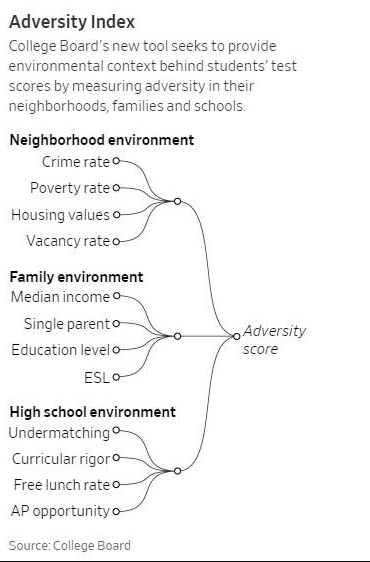The Wall Street Journal recently unveiled of what’s being called, “SAT Adversity Score”, which is an attempt to address the question of fairness in college admissions, as well as the “nature vs. nurture” debate about what most influences a human to develop their full human potential.
In their own executive summary, The College Board reasons the development of an “Adversity Score”, as part of an on-going initiative to create a “data-driven model of admissions”:
Throughout our discussions with admission practitioners over the past year, they repeatedly expressed an interest in more systematic information about applicants who may have overcome environmental obstacles before applying to college. This desire is typically related to the recognition that, for many applicants, their sociocultural milieu can limit their ability to reach their full educational potential prior to college. Many colleges’ missions also encourage them to consider a wide range of contextual factors beyond student academic performance.

Yet, in attempting to quantify a person’s surrounding environment, as a means to reduce bias and assumption in determining a student’s admissions, bias and assumption may actually be increased. With the Adversity Score, admissions officers then must interpret the data. As current Ivy League student whom I advised, stated:
…how much more adversity did a 70 experience than a 65? [The] precision [that] numbers appear to provide instead may suggest disparities between applicants where none exist.
Thus, in the holistic review of an applicant, or the consideration of grades, standardized test scores, extracurricular activities, letters of recommendation and personal essays, how college admissions officers may apply the socio-economic context, can vary per campus, thus create a “bias” in the admissions process.
And, despite the intentions of such efforts like an “Adversity Score”, to create equity of outcome in college admissions, which most agree is just, some can perceive “fairness” at the cost of another is not fair at all. One client has already asked if their student should forgo taking the SAT at all, so no adversity score will be presented and only take the ACT.
While in a recent ZeroHedge post, Tyler Durden posited:
And got us wondering, how long before well-off, so-called ‘advantaged’ families start moving into poor lower-class neighborhoods for just long enough to benefit from the adversity score…
The subjectivity of college admissions is inherent to the process and meritocracy. As happens every year, one student is admitted while others are not, despite disparities in qualifications.
However, in creating “Adversity Scores” and other seemingly reasonable means to level the playing field, the questions about why there’s such an “arms race” for college admissions continues to be muted. When will we return to asking, “How do we best assist our youngest generations in developing their potential?” and “What is the value of a college degree?“



